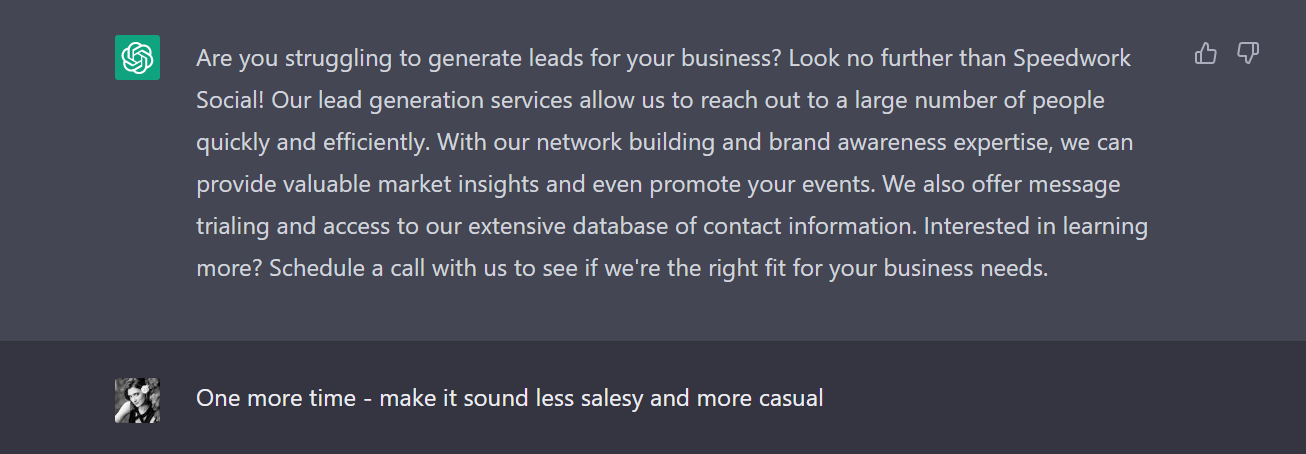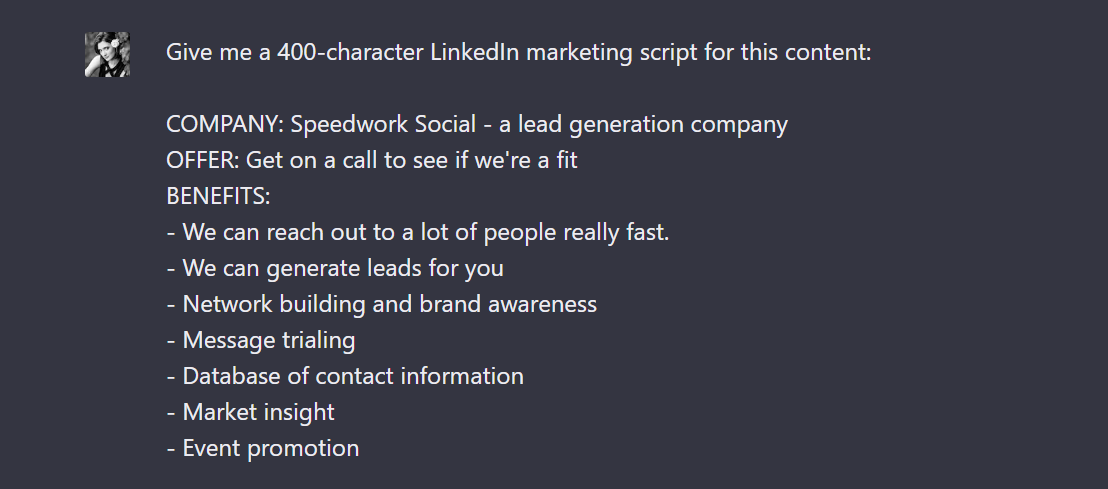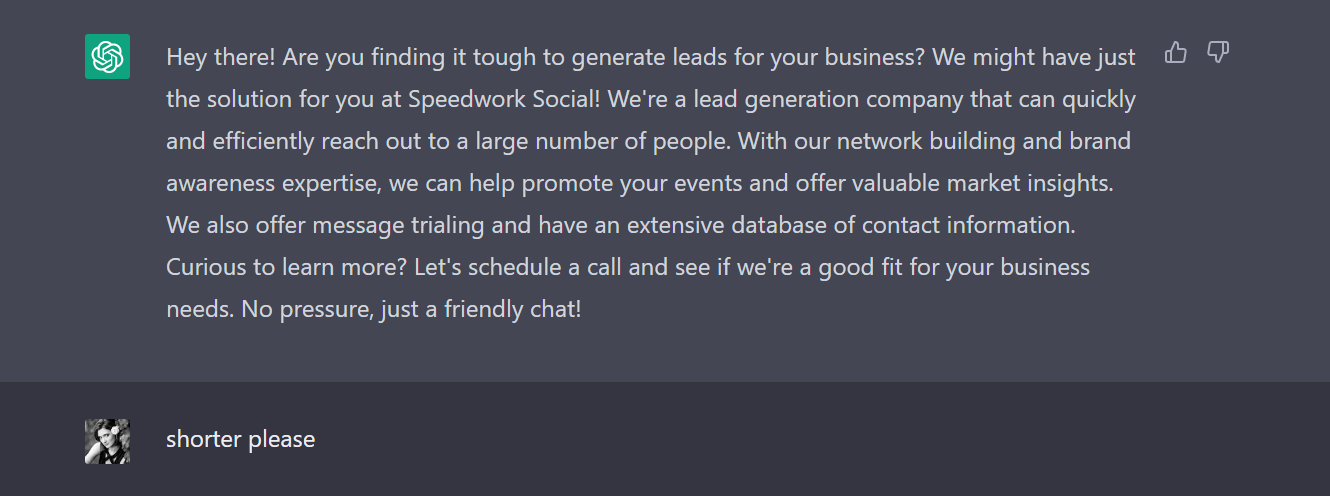With the rise of artificial intelligence (AI), copywriters worry that their jobs may become obsolete. So then, what is ChatGPT? ChatGPT specifically is a powerful language model trained by OpenAI that can write marketing scripts and other types of content— but there are several reasons why we believe ChatGPT won’t replace real copywriters.
Here are our top six!
What is AI?
First of all, what is AI anyway?
AI refers to the simulation of human intelligence in machines that are programmed to think and learn like humans. This includes machine learning, natural language processing, and computer vision, among others. AI has become increasingly popular in recent years due to its ability to automate tasks, improve efficiency, and reduce costs.
AI is a great tool to expedite basic research, among other things. In no way are we bashing automated tools or AI, but there are several areas where it just doesn’t compare to the real deal.
1. Creative Thinking
One of the biggest strengths of real copywriters is their ability to think creatively and take risks that can pay off big time. On the other hand, ChatGPT can only plug and play the information it gets with what’s been done before.
Copywriters are skilled at developing unique ideas and crafting compelling stories that resonate with their target audience. ChatGPT is limited to generating content based on the patterns it has learned from the dataset it was trained on.
In other words, it knows what is popular, but it doesn’t know why certain writing strategies are popular – just that they are popular and can be replicated when requested. It can learn/regurgitate information, but it often seems dull when compared to the real deal because it doesn’t know how to go off the beaten path and try the risky, avant-garde strategies that human writers can dream up so naturally.
2. Emotional Intelligence
In a similar vein, AI doesn’t have the capacity to understand what is truly eye-catching and unique because it can’t understand human emotions or behavior.
Copywriting often involves creating content that elicits an emotional response from the reader. This requires a deep understanding of human psychology and the ability to empathize with the reader. ChatGPT, as an AI language model, does not have emotions or the ability to empathize with humans, which may limit its ability to create emotionally impactful content.
Take a quick look at the pitch message ChatGPT wrote for us:

Notice how it sounds fake and even a little bit cliché?
The best way to pitch is to have a casual conversation and focus on what problems your prospect is likely facing. A pitch like the one ChatGPT gave me just screams “ME! ME! ME!” No one is going to bite at that kind of offer.
It’s a much better strategy to write for the human being on the other side of the line than to copy/paste the same generic message. People like stories. They like adventure. They like feeling heard. Sales messages that scream “ME! ME! ME!” raise a bunch of red flags, which inevitably makes people ignore your message.
Computers can’t tell the difference, but real copywriters can.
For more information on how to put the human connection first, check out our post (HERE).
3. Understanding Brand Voice
Copywriting also involves understanding a brand’s voice and tone and creating content that aligns with it. A skilled copywriter can adapt their writing style to match a brand’s personality and values. ChatGPT, on the other hand, may not be able to understand a brand’s unique voice and tone, which could lead to content that feels generic and impersonal.
Some of the best parts about being a business copywriter are the interviews with business founders. Everyone has a different story to tell, a different voice, with different goals. Brand and tone are what differentiate a company from its competitors. We see that our clients yield much better results when they’ve chosen to serve a niche versus just anyone who’ll have them.
Because we know these things, most copywriters tend to stay focused on interviewing the client, paying close attention to the words and phrases they use to describe their offer, figuring out what’s most important, and then delivering a writing sample that feels like it could’ve come from their own marketing playbook.
4. Contextual Understanding
Copywriting often requires an understanding of the broader context in which a piece of content will be read. A copywriter must be able to consider the target audience, the platform, and the cultural and social factors that may impact how the content is received. ChatGPT, as an AI language model, may have this contextual understanding if the subject is popular enough online, but it’s always going to be at least one news cycle behind the present day.
This often results in content that feels out of touch or inappropriate.
Imagine a campaign promoting interior paint in the immediate week after a study was released proving lead, which at one time was in most paints, to be toxic.
This could either be a great opportunity to market the paint progressively, or a huge failure. Failing to assure the customers that there is no lead in the paint would be catastrophic, while building an entire campaign about the alternative, safe, materials in the paint would be capitalizing off of the current news.
Additionally, failing to understand/interact with present day news can result in missed opportunities for your business.
5. Specific Instructions
If you’re going to use ChatGPT in your business (And there are plenty of other reasons why you should), you still shouldn’t use it to replace your copywriters. It’s important to have someone with industry knowledge in order to give the tech specific enough instructions and even fact check its statistics.
We tested ChatGPT and compared its writing to our own. While it eventually figured out what we were looking for, it took us a while to learn how it processes the requirements you give it.
Here’s what we started with, a request to write a 400-character LinkedIn marketing script that shares our company name, offer, and a list of benefits:

This is what it gave us:

Alongside the tone/perspective issues, we discovered that ChatGPT doesn’t have legacy knowledge.
Let’s break that down.
Writers know how to write by reading (which ChatGPT can do, yes), but we also learn from writers who sit down with us and teach us, providing a revision and editing feedback loop. Eventually, this cycle turns into legacy knowledge. ChatGPT just isn’t specialized enough to replicate this.
As experienced writers in the industry, we know that “a 400-character LinkedIn marketing script” needs to follow some rules:
- Be around 400 characters.
- Written with respect to the LinkedIn user’s perspective.
- Aim to make the sale without coming across as predatory.
As writers, we know what an appropriate balance looks like. In the first example, it prioritizes the marketing and the character count because – even though we added “LinkedIn” in the mix – simply stating “LinkedIn” doesn’t carry a connotation that AI can understand. It’s specialized industry knowledge that LinkedIn users respond in certain ways to certain messages.
After we adjusted for tone, this is what the program gave us:

ChatGPT forgot the 400 character limit. Oops!
We made sure to add that rule back in:

This is a much better pitch message than the first one it gave us. It’s not perfect, but it’s better. That being the case, someone who just needs a script and doesn’t share our industry knowledge may not have known which specifications to make just by looking at the initial pitch it gave us.
This is why most companies likely won’t eliminate the copywriting role. Even if they tried, it would only eliminate insights like this. Sales would tank.
6. Human Touch
Finally, one of the most important reasons why ChatGPT won’t replace real copywriters is the human touch.
Copywriting is a collaborative process that involves working with clients, designers, and other team members. The ability to build relationships, communicate effectively, and work collaboratively is a key strength of human copywriters that cannot be replicated by an AI language model.
Simply put: our clients don’t come to us to simply use a formula and throw words on a page. Anyone can do that. You could do it yourself or even hire an intern to save yourself some time. But you know that unless there’s some experience there already, it isn’t going to be “good.”
You hire a copywriter because you want a message that sparks interest and follow-through among your prospects, and that takes not only a good knowledge database, but empathy, creativity, critical thinking, and real skill.
